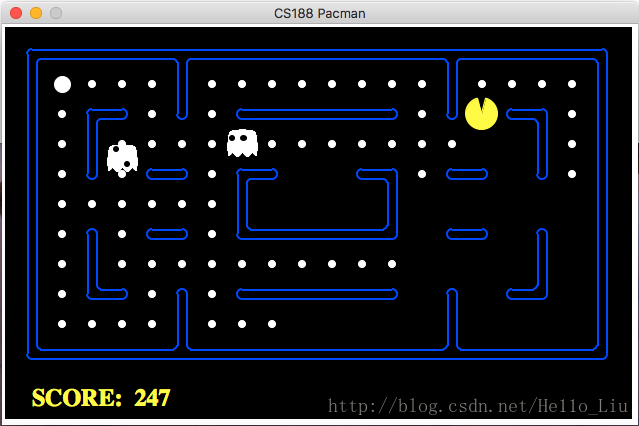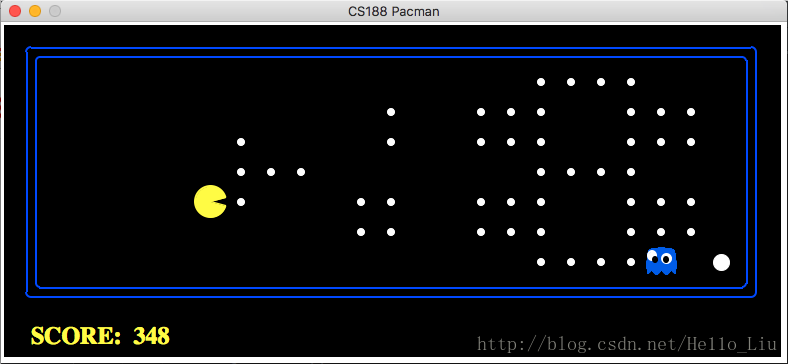算法学习:Pac-Man的简单对抗
Pacman项目是加州大学伯克利分校提供的一个可视化的AI学习平台。其主体利用python完成。该项目提供了丰富的说明文档,以及预先实现了一些简单的算法供参考各接口的使用。
http://ai.berkeley.edu/project_overview.html
本文利用Pac-Man平台实现简单的对抗搜索。
Part1 : Reflex Agent
提供的ReflexAgent有以下接口:
class ReflexAgent(Agent):
def getAction(self,gameState)
def evaluationFunction(self, currentGameState, action)根据对getAction的分析:
def getAction(self, gameState) #根据当前的评估函数确定下一步的动作
#获取当前可能的下一步的方向 有stop east ...
legalMoves = gameState.getLegalActions()
#根据评估函数获取所有的下一步的权值
scores = [self.evaluationFunction(gameState, action) for action in legalMoves]
#获取最好的分数
bestScore = max(scores)
#根据最好的分数获取最好的行动选择
bestIndices = [index for index in range(len(scores)) if scores[index] == bestScore]
#从最好的行动集合中随机选择一个最为下一步的动作
chosenIndex = random.choice(bestIndices)
return legalMoves[chosenIndex]可知evaluationFunction是这个Agent的灵魂,评估每一个输入的分数。根据提供的下面函数的接口,设计了一个简单的Pacman的AI。
初始版本的AI如该类所述,只提供了基本的反射。该agent所处环境包括以下内容
- 食物到Agent的距离
- 怪兽到Agent的距离
- 超级豆子到Agent的距离
- 下一个状态能否吃到豆子 或者被Ghost吃掉
计算出这些参数,给这些参数以固定的权值,就写出了最基础的AI
def evaluationFunction(self, currentGameState, action):
# 获取当前游戏状态 其中G表示为Ghost %表示为墙 角标表示pacman 角标方向代表上一次选择的方向
successorGameState = currentGameState.generatePacmanSuccessor(action)
# print 'successorGameState\n',successorGameState
# 获取这样移动后新的位置
newPos = successorGameState.getPacmanPosition()
# print 'newPos',newPos
# 获取食物在图中的分布(二维数组,有失误为T没食物为F)
newFood = successorGameState.getFood()
curFood = currentGameState.getFood()
# print 'newFood',newFood
# 获取Ghost的位置
newGhostStates = successorGameState.getGhostStates()
# print 'ghostState',newGhostStates[0].getPosition()
# 获取吃超级豆子之后 Ghost害怕还剩余的时间
newScaredTimes = [ghostState.scaredTimer for ghostState in newGhostStates]
# 对这个选择评估的分数
currscore = 0
if action == "Stop":
return -100
# 如果当前状态能够使ghost害怕,将所有的时间加入进来
for st in newScaredTimes:
currscore += st
# 根据Ghost所在的位置,获取与当前位置的距离
ghost_distances = []
for gs in newGhostStates:
ghost_distances += [manhattanDistance(gs.getPosition(),newPos)]
# 获取food所在的所有pos
foodList = newFood.asList()
curfoodList = curFood.asList()
# 获取food所在的所有wall
wallList = currentGameState.getWalls().asList()
# 保存food的距离
food_distences = []
# 获取所有食物到达当前位置的距离
for foodpos in foodList:
food_distences += [manhattanDistance(newPos,foodpos)]
# 对食物的距离取反
inverse_food_distences=0;
if len(food_distences)>0 and min(food_distences) > 0:
inverse_food_distences = 1.0 / min(food_distences)
# 考虑了ghost与当前的距离,其权值更大
currscore += min(ghost_distances)*(inverse_food_distences**4)
# 获取当前系统判定的分数 又可能当前吃到了豆子 分数更高些
currscore+=successorGameState.getScore()
if newPos in curfoodList:
currscore = currscore * 1.1
return currscore运行测试
python autograder.py -q q110次测试如下
Pacman emerges victorious! Score: 1228
Pacman emerges victorious! Score: 1253
Pacman emerges victorious! Score: 1246
Pacman emerges victorious! Score: 1255
Pacman emerges victorious! Score: 1247
Pacman emerges victorious! Score: 1257
Pacman emerges victorious! Score: 1244
Pacman emerges victorious! Score: 1260
Pacman emerges victorious! Score: 1261
Pacman emerges victorious! Score: 1258
Average Score: 1250.9
Scores: 1228.0, 1253.0, 1246.0, 1255.0, 1247.0, 1257.0, 1244.0, 1260.0, 1261.0, 1258.0
Win Rate: 10/10 (1.00)
Record: Win, Win, Win, Win, Win, Win, Win, Win, Win, Win测试GUI
直接运行游戏GUI
python pacman.py -p ReflexAgent -k 2Part 2 : MinMax
利用MinMax博弈树,这里模拟的Ghost可能不止一个,在计算Min节点的时候增加了对多Ghost的支持。
实际运行游戏时候,可以用-k参数(<3)来选择Ghost个数。
与gameState.getNumAgents()对接,可以模拟多个Ghost,从而选择威胁最大的那个作为最终的min节点。
class MinimaxAgent(MultiAgentSearchAgent):
def getAction(self, gameState):
def max_value(state, currentDepth):
# 当前深度加一
currentDepth=currentDepth+1
# 若当前状态已经赢了或输了 或者 已经到达了规定的深度
if state.isWin() or state.isLose() or currentDepth == self.depth:
return self.evaluationFunction(state)
# 初始化v
v= float('-Inf')
# 对每个min分支求max
for pAction in state.getLegalActions(0):
v=max(v, min_value(state.generateSuccessor(0, pAction), currentDepth, 1))
return v
def min_value(state, currentDepth, ghostNum):
# 若当前状态已经赢了或输了
if state.isWin() or state.isLose():
return self.evaluationFunction(state)
# 初始化v
v=float('Inf')
# 对每个max分支求min 其中有多个Ghost 所有多个Ghost分支
for pAction in state.getLegalActions(ghostNum):
if ghostNum == gameState.getNumAgents()-1:
#所有Ghost的min找完了 开始找下一个max
v=min(v, max_value(state.generateSuccessor(ghostNum, pAction), currentDepth))
else:
#继续下一个Ghost
v=min(v, min_value(state.generateSuccessor(ghostNum, pAction), currentDepth, ghostNum+1))
return v
# pacman下一个状态可能的行动
Pacman_Actions = gameState.getLegalActions(0)
maximum = float('-Inf')
result = ''
# 针对下一个状态 寻找获胜概率最高的move
for action in Pacman_Actions:
if(action != "Stop"):
currentDepth = 0
# 而所有的Ghost希望胜利概率最低的选择
currentMax = min_value(gameState.generateSuccessor(0, action), currentDepth , 1)
if currentMax > maximum:
maximum=currentMax
result =action
return result
当开始跑测试的时候,就发现在下面参数的情况下,走一步已经非常吃力了,其时间复杂度过高。
运行命令python pacman.py -p MinimaxAgent -k 2 -a depth=4
输出每步决策所消耗的时间,每步大致花费时间如下,Time的单位为ms:
Go East Value is 43.0 Time: 1994.49194336
Go East Value is 50.0 Time: 6805.0690918
Go East Value is 58.0 Time: 4821.87817383
Go East Value is 67.0 Time: 3456.60791016
Go North Value is 76.0 Time: 1419.2019043
Go North Value is 63.0 Time: 3504.87597656
Go East Value is 72.0 Time: 2485.83081055
Go East Value is 103.0 Time: 1185.18701172每步所花费时间大概在3s左右,当三个Agent的选择均非常多的情况下,每步所消耗的时间有可能会到达6s
急需AlphaBate剪枝,下面加入AlphaBate剪枝。
Part 3 : Alpha-Bate 剪枝
class AlphaBetaAgent(MultiAgentSearchAgent):
def getAction(self, gameState):
def max_value(state, alpha, beta, currentDepth):
# 当前深度加一
currentDepth=currentDepth+1
# 若当前状态已经赢了或输了 或者 已经到达了规定的深度
if state.isWin() or state.isLose() or currentDepth == self.depth:
return self.evaluationFunction(state)
v=float('-Inf')
# 对每个min分支求max
for pAction in state.getLegalActions(0):
if pAction!="Stop":
v=max(v, min_value(state.generateSuccessor(0, pAction), alpha, beta, currentDepth, 1))
# 若已经比beta要大了 就没有搜索下去的必要了
if v >= beta:
return v
# 更新alpha的值
alpha=max(alpha, v)
return v
def min_value(state, alpha, beta, currentDepth, ghostNum):
# 若当前状态已经赢了或输了
if state.isWin() or state.isLose():
return self.evaluationFunction(state)
# 初始化v
v=float('Inf')
# 对每个max分支求min 其中有多个Ghost 所有多个Ghost分支
for pAction in state.getLegalActions(ghostNum):
if ghostNum == gameState.getNumAgents()-1:
# 所有Ghost的min找完了 开始找下一个max
v=min(v, max_value(state.generateSuccessor(ghostNum, pAction), alpha, beta, currentDepth))
else:
# 继续下一个Ghost
v=min(v,
min_value(state.generateSuccessor(ghostNum, pAction), alpha, beta, currentDepth, ghostNum+1))
# 若比alpha还要小了 就没搜索的必要了
if v <= alpha:
return v
# 更新beta的值
beta=min(beta, v)
return v
# pacman下一个状态可能的行动
pacmanActions=gameState.getLegalActions(0)
maximum=float('-Inf')
# 初始化alpha bate
alpha=float('-Inf')
beta=float('Inf')
maxAction=''
# 针对下一个状态 寻找获胜概率最高的move
for action in pacmanActions:
if action!="Stop":
currentDepth=0
# 而所有的Ghost希望胜利概率最低的选择
currentMax=min_value(gameState.generateSuccessor(0, action), alpha, beta, currentDepth, 1)
if currentMax > maximum:
maximum=currentMax
maxAction=action
print maximum
return maxAction利用了AlphaBate之后 在同样的参数下 运行速度明显增加。
但是由于效果还是不好,感觉是系统提供的启发函数不太完美。系统提供的接口如下:
class MultiAgentSearchAgent(Agent):
def __init__(self, evalFn = 'scoreEvaluationFunction', depth = '2'):
self.index = 0 # Pacman is always agent index 0
self.evaluationFunction = util.lookup(evalFn, globals())
self.depth = int(depth)
在第一部分的基础反射启发函数基础上,修改默认的启发函数如下:
def scoreEvaluationFunction(currentGameState,cur_score):
# 获取food所在的所有wall
wallList=currentGameState.getWalls().asList()
Pos = currentGameState.getPacmanPosition()
# 获取食物在图中的分布(二维数组,有失误为T没食物为F)
curFood=currentGameState.getFood()
# 获取Ghost的位置
GhostStates=currentGameState.getGhostStates()
# 获取吃超级豆子之后 Ghost害怕还剩余的时间
scaredTimes=[ghostState.scaredTimer for ghostState in GhostStates]
# 对这个选择评估的分数
currscore=0
# 根据Ghost所在的位置,获取与当前位置的距离
ghost_distances=[]
for gs in GhostStates:
ghost_distances+=[manhattanDistance(gs.getPosition(), Pos)]
ghost_index = 0;
min_ghost_distances = min(ghost_distances);
is_scared = False
for time in scaredTimes:
if time != 0:
is_scared = True
else:
is_scared = False
break
# 获取food所在的所有pos
curfoodList=curFood.asList()
# 保存food的距离
food_distences=[]
# 获取所有食物到达当前位置的距离
for foodpos in curfoodList:
food_distences+=[manhattanDistance(Pos, foodpos)]
# 对食物的距离取反
inverse_food_distences=0;
if len(food_distences) > 0 and min(food_distences) > 0:
inverse_food_distences=1.0 / min(food_distences)
if is_scared and min_ghost_distances!=0:
# if min_ghost_distances < 10:
# min_ghost_distances = 800 min_ghost_distances
# else:
# min_ghost_distances = 600 min_ghost_distances
print "Ghost Scared!"
min_ghost_distances = min_ghost_distances * 0.8
# 考虑了ghost与当前的距离,其权值更大
if min(ghost_distances) == 0:
currscore+=inverse_food_distences
else:
currscore+= min_ghost_distances * (float(inverse_food_distences))
# 获取当前系统判定的分数 又可能当前吃到了豆子 分数更高些
currscore+=currentGameState.getScore()
return currscore测试命令 python pacman.py -p AlphaBetaAgent -k 2 -a depth=4
输出每步决策所消耗的时间,每步大致花费时间如下,Time的单位为ms:
Go East Value is 43.0 Time: 215.517822266
Go East Value is 50.0 Time: 820.08203125
Go East Value is 58.0 Time: 712.662841797
Go East Value is 69.0 Time: 320.084960938
Go North Value is 78.0 Time: 1038.60400391
Go North Value is 66.0 Time: 862.83203125
Go East Value is 76.0 Time: 774.194091797
Go East Value is 108.0 Time: 357.637207031
Go East Value is 113.5 Time: 812.993164062
Go North Value is 126.0 Time: 402.672851562每步用时比没有剪枝的情况减少了一半以上
正常测试平均在1500 point左右,但仍然存在以下问题
- 当两个Agent分别在Pacman的两边或两边存在同样数量的豆子时,左右徘徊
- 因为使用MinMax博弈树 而Ghost在离Pacman足够远时威胁很小
- 导致Agent Pacman在豆子吃了大部分的时候非常谨慎
- 参数调配问题
由于这些问题,导致了Pacman在某些情况下依旧显得不够智能。在该问题的实际情况中:
Ghost其实并没有博弈的概念,所以大部分猜想是浪费时间的
Pacman游戏其实只需要局部考虑,无需过多全局考虑,也就是说:
当Ghost离Agent足够远的时候,其实Ghost的行动对于Pacman影响不大,没必要过多考虑。
但是比如围棋博弈,这种全局观念就很重要了。
启发函数还是人为为Ghost制定反射

